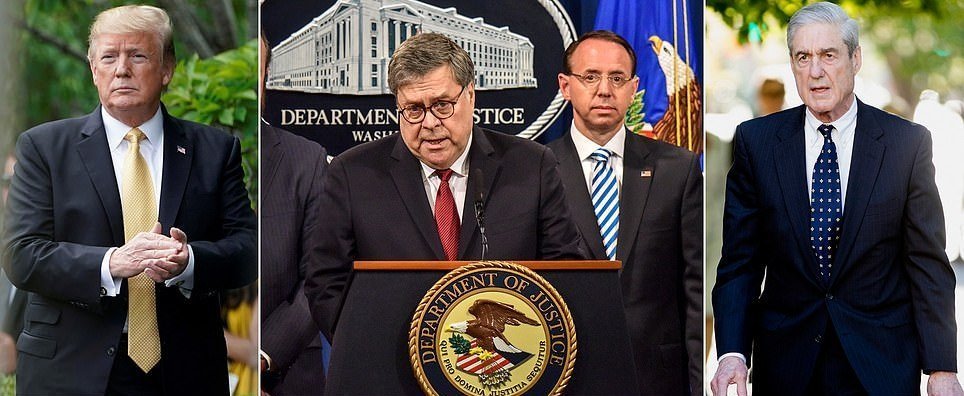Robert Mueller wrote a letter in late March to Attorney General William Barr objecting to his early description of the Russia investigation’s conclusions that appeared to clear President Trump on possible obstruction of justice.
The letter adds to the growing evidence of a rift between them and is another sign of the anger among the special counsel’s investigators about Barr’s characterization of their findings, which allowed Trump to wrongly claim he had been vindicated.
It was unclear what specific objections Mueller raised in his letter.
Barr defended his descriptions of the investigation’s conclusions in conversations with Mueller over the days after he sent the letter, according to two people with knowledge of their discussions.
Barr, who was scheduled to testify on Wednesday before the Senate Judiciary Committee about the investigation, has said publicly that he disagrees with some of the legal reasoning in the Mueller report.
Senior Democratic lawmakers have invited Mueller to testify in the coming weeks but have been unable to secure a date for his testimony.
A central issue in the simmering dispute is how the public’s understanding of the Mueller report has been shaped since the special counsel ended his investigation and delivered his 448-page report on March 22 to the attorney general, his boss and longtime friend.
The four-page letter that Barr sent to Congress two days later gave little detail about the special counsel’s findings and created the impression that Mueller’s team found no wrongdoing, allowing Trump to declare he had been exonerated.
But when Mueller’s report was released on April 18, it painted a far more damning picture of the president and showed that Mueller believed that significant evidence existed that Trump obstructed justice.
Over the past month, other signs of friction between the attorney general and the special counsel have emerged over issues like legal theories about constitutional protections afforded to presidents to do their job and how Mr. Mueller’s team conducted the investigation.
In congressional testimony in April before the report was released, Barr demurred when asked whether he believed that the investigation was a “witch hunt” — Trump’s preferred term. It “depends on where you’re sitting,” Barr replied.
“If you are somebody who’s being falsely accused of something, you would tend to view the investigation as a witch hunt,” he said, an apparent reference to the president.
Barr’s testimony stood in contrast to comments he made during his confirmation hearing in January. “I don’t believe Mueller would be involved in a witch hunt,” he said then.
A rift between the men appeared to develop in the intervening months as the special counsel wrapped up his inquiry.
Barr and senior Justice Department officials were frustrated with how Mueller ended his investigation and drafted his report, according to the two people with knowledge of the discussions and another person briefed on the matter.
They expressed irritation that Mueller fell short of his assignment by declining to make a decision about whether Trump broke the law.
That left Barr to clear Trump without the special counsel’s backing.
The senior department officials also found Mueller’s rationale for stopping short of deciding whether Trump committed a crime to be confusing and contradictory, and they concluded that Mueller’s report showed that there was no case against Trump.
But Mueller did lay out evidence against the president.
After explaining that he had declined to make a prosecutorial judgment, citing as a factor a Justice Department view that sitting presidents cannot be indicted, the special counsel detailed more than a dozen attempts by the president to impede the inquiry.
He also left open the door for charges after Trump leaves office.
“If we had confidence after a thorough investigation of the facts that the president clearly did not commit obstruction of justice, we would so state,” Mueller and his investigators wrote. “Based on the facts and the applicable legal standards, however, we are unable to reach that judgment.”
Some of the special counsel’s investigators have told associates that they were angry about Barr’s initial characterization of their findings, government officials and others have said, and that their conclusions were more troubling for Trump than Barr indicated in his four-page letter.
That proved to be the case.
In once instance, Barr took Mueller’s words out of context to suggest that the president had no motive to obstruct justice.
In another instance, he plucked a fragment from a sentence in the Mueller report that made a conclusion seem less damaging for Trump.
